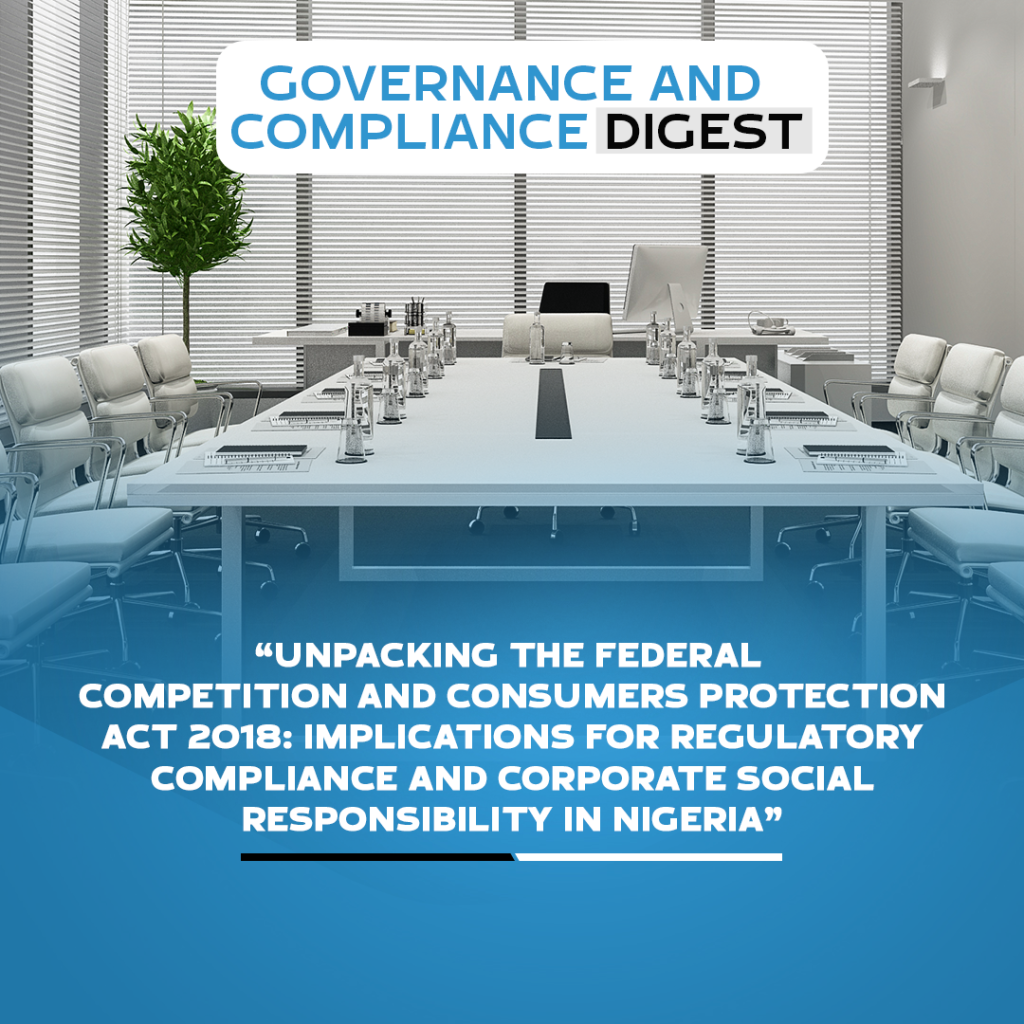The Federal Competition and Consumer Protection Act (FCCPA) of 2018 is a crucial piece of legislation that has significant implications for regulatory compliance in Nigeria. The act aims to promote fair competition, protect consumer rights, and promote corporate social responsibility (CSR) in the Nigerian market.
One of the key aspects of the FCCPA is its regulatory compliance requirements. The act imposes a range of obligations on businesses operating in Nigeria, including requirements related to competition, consumer protection, and CSR. These obligations are designed to ensure that businesses operate in a manner that is fair, transparent, and socially responsible.
One of the key compliance requirements under the FCCPA is related to competition. The act prohibits anti-competitive practices such as price-fixing, bid-rigging, and abuse of dominant market positions. It also requires businesses to obtain prior approval from the Federal Competition and Consumer Protection Commission (FCCPC) before engaging in certain types of business transactions, such as mergers and acquisitions. This requirement is designed to ensure that businesses do not engage in activities that could harm competition or restrict consumer choice.
Another important compliance requirement under the FCCPA is related to consumer protection. The act requires businesses to provide accurate and truthful information to consumers, and prohibits unfair and deceptive practices. It also establishes a Consumer Protection Council (CPC) that is responsible for protecting the rights of consumers and enforcing the provisions of the act. Businesses are required to cooperate with the CPC and provide any information that is necessary for the council to carry out its functions.
The FCCPA also imposes compliance requirements related to CSR. The act requires businesses to consider the impact of their operations on society and the environment, and to take steps to mitigate any negative effects. This includes, among other things, respecting human rights, promoting gender equality, and protecting the environment. Businesses are required to report on their CSR activities annually, and failure to comply with these requirements can result in fines or other penalties.
However, compliance with the FCCPA is not always straightforward. The act is complex and can be challenging for businesses to navigate, particularly SMEs that may lack the resources to fully understand their obligations. There is also a need for adequate training and education to ensure that businesses are aware of their obligations and can comply with them effectively.
Enforcement is another important aspect of regulatory compliance under the FCCPA. The act establishes a range of enforcement measures, including fines, injunctions, and other penalties. However, effective enforcement requires adequate resources and capacity within the FCCPC, as well as a commitment from the government to take compliance seriously.
In conclusion, the FCCPA of 2018 represents a major step forward for regulatory compliance in Nigeria. By promoting fair competition, protecting consumer rights, and promoting CSR, the act helps to create a business environment that is more transparent, accountable, and responsible. However, compliance with the act can be challenging, particularly for smaller businesses, and effective enforcement is crucial to ensure that businesses operate in a manner that is consistent with the objectives of the act.
References
- Federal Competition and Consumer Protection Act (FCCPA) 2018
- “The Federal Competition And Consumer Protection Act 2019: Regulatory Implications For Merger Transactions In Nigeria”, Mondaq, 20 March 2019.
- “Federal Competition and Consumer Protection Act”, KPMG, 21 March 2019.
- “The Federal Competition and Consumer Protection Act 2018: A giant stride in the right direction”, Gbenga Biobaku & Co., 24 May 2019.
For further discussion and assistance with filing any of your organization’s compliance returns to the Corporate Affairs Commission, as well as providing you with Board Evaluation and Nominee services, please contact us at contact@firstfiduciary.ng or any of the team member below:
Frances Nwakobi-Onuigbo
frances.nwakobi@firstfiduciary.ng
+234 803 738 4994
Elizabeth Adedayo
elizabeth.adedayo@firstfiduciary.ng
+234 810 465 2726

Debt servicing hit $112m in January – CBN
The Federal Government spent $112.35m servicing external debt in January 2023, according to findings by The PUNCH.
READ MORE
Oil production now one million barrels lower daily
Nigeria’s oil production is currently lower than its technical allowable capacity by about one million barrels per day, the Federal Government announced on Wednesday.
READ MORE
Nigeria collects only 40% of natural resources revenue – World Bank
The World Bank has disclosed that Nigeria and other metals and mineral resource-rich countries in Sub-Saharan Africa can double revenues from natural resources such as minerals, oil, and gas.
READ MORE
Senate confirms NDIC board members
The Senate on Tuesday confirmed the appointment of AbdulHakeem Mobolaji and six others as members of Governing Board of the Nigerian Deposit Insurance Corporation (NDIC).
READ MORE
